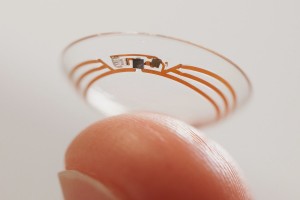Concept Google contact lens for the password "input"
Google is developing smart contact lens that can identify a person faster and easier.
 In the bowels of Google X actively pursuing smart contact lenses that can help diabetics control glucose levels in the blood. However, the ideas of science fiction in respect of contact lenses does not end there - Google has released a couple of new patents relating to this topic.
In the bowels of Google X actively pursuing smart contact lenses that can help diabetics control glucose levels in the blood. However, the ideas of science fiction in respect of contact lenses does not end there - Google has released a couple of new patents relating to this topic.
If Google is able to translate his ideas into practice in the future we can have contact lenses that transform the human eye in a simple and rapid means of identification. As is known, the iris of the human eye is unique and can act as one of the biometric identifiers of the individual.
Process Google patent consists of three stages. First - the delivery of light to the iris. Then, one or more sets of photosensitive sensors arranged on the surface or within the contact lens and covering at least a portion of the eye, are recorded by the iris reflect light to create an image with a certain pattern.
The third stage - the emission of the iris based identifiers. Through this process, the back plate must be much more reliable.
Google suggests use in such lenses capacitive only to identify the human eye present in the glass and not any other copy or sensors. Inability corneal counterfeiting refers to the fiction film "Minority Report," where the hero had to use eye transplant to avoid detection system of total surveillance.
Contact lenses may also collect other biometric information to improve the identification, for example, the amount allocated to the rate of liquid eyes, twinkling and so on. Given the fact that the products are intended for purposes of serious security, but not for simple unlock the phone (almost no one wants to buy contact lenses only to simplify the work with a mobile device), they must ensure a high level of safety and very low participation errors.
It's just the patents never materialize into real products. However, few people believed that contact lenses for diabetics appear on the market soon, as Google has recently announced a partnership with Novartis, under which these products have the potential to go on sale. So who knows what direction will develop smart contact lenses? Indeed, in April this year, Google has patented the idea of contact lenses with built-in miniature cameras - this is a real find for the spy.
Axarhöfði 14,
110 Reykjavik, Iceland














